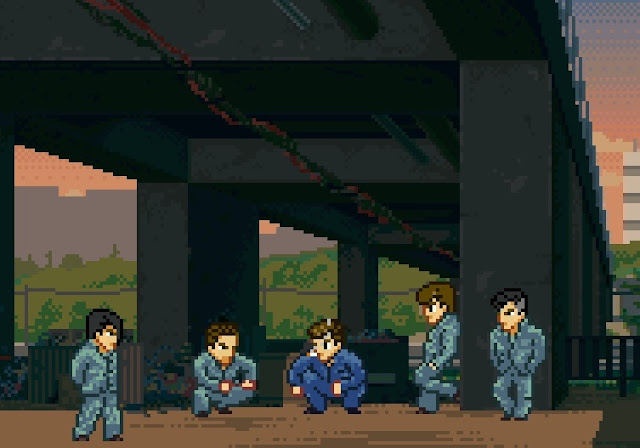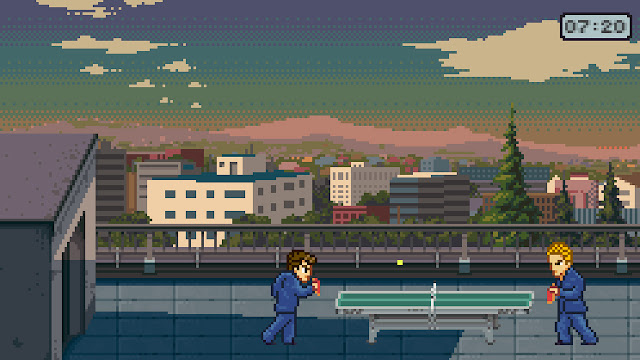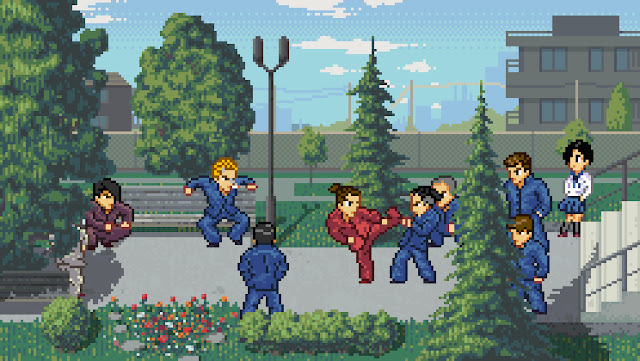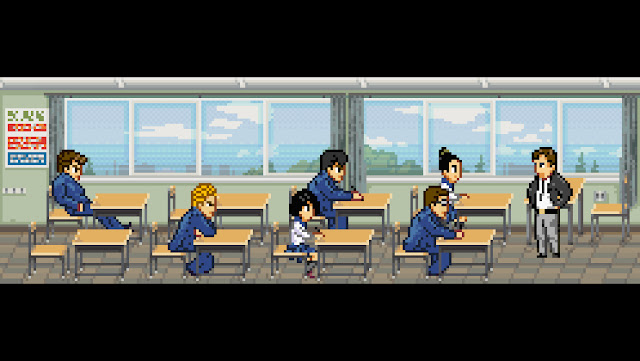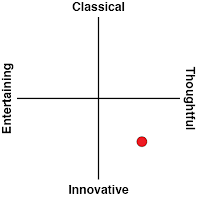Review by Matt S.
I would never have expected a game that looks like a love letter to River City Ransom, and is about school gangs beating up on one another, would offer up such meaningful insights about the existential dread that many face going through their teenage years. But here we are in 2019 with the remarkably subtle and intelligent The Friends of Ringo Ishikawa, and here I am more delighted by a game has exceeded my expectations than I have been in quite some time.
You play as the titular Ringo Ishikawa. The kid’s got potential – a teacher tells him as much within the first couple of minutes – but he’s also aimless and directionless, and has fallen in to become the leader of a gang of similarly lost young souls. So Ishikawa runs around town, beating up people in rival gangs, stocking up on smokes, slamming down burgers with his gang mates and… studying in the library?
Right from the outset, this game offers you an open world sandbox to play around in that’s not unlike what you would expect to find in a Persona title. You’ve got plenty of free time time to choose what kinds of activities you get up to, from hanging out with mates to earning cash (sometimes even in legitimate ways), or alternatively, hitting the books to improve your school grades. Perhaps the most fascinating thing about The Friends of Ringo Ishikawa, though, is that the game refuses to tell you anything about what you can – or should – be doing. Every single activity or decision you make you’ll figure out on your own, simply by playing. There’s not even a map, nor quest markers. There are some overall objectives, but you’ll not know what those are for the longest time, because there’s also trail of bread crumbs to get there, nor are the objectives made clear at the start.
This is frustrating at first, since the “open world” that events take place within is fairly large, and not being sure what to do results in a lot of wasted time running around looking for something to do – or the right place to visit. After a while, though, it becomes quite obvious that this aimlessness and confusion is built right into the design and pacing of the game. You’re confused about what Ishikawa should be going, because Ishikawa himself is confused about what he should be doing in life. Slowly, through the actions that you do choose, Ishikawa’s path through life starts to be laid out for him. Don’t spend much time at school and Ishikawa’s potential for legitimate work is flushed down the drain. And yet, the rewards for beating up rival gangs and taking all their cash is… so compelling. Of course, if you beat up on one gang too much, that can escalate rapidly into an all-out gang war. Balances within the systems of Ringo Ishikawa are delicate, and the whole point is that you’re meant to be constantly second guessing what you should be doing next. I don’t think I’ve ever played a game that’s a more perfect metaphor for the coming of age experience through the school years.
Tonally, Ringo Ishikawa is also the polar opposite of what I was expecting. You would expect a story about aspiring yakuza gangsters to be loud and punkish – especially when combined with the brawler genre as it is. Instead, if I was looking for a point of comparison to Ringo Ishikawa, I’d be saying it’s more like Shenmue than Double Dragon, thanks to its more subtle soundtrack, and long periods of “white noise” in the timeline. Brawls come and go, but between them are long stretches where there’s not much to do but run around town from one time-filling location to the next, a cigarette hanging out of Ishikawa’s mouth.
Whether it’s Japan or Australia, America or Europe, you always feel a little bit sorry for teenagers who grow up in rural communities, or the bowels of suburbia. I know – I was one of them. There’s simply not much for a young person to do, and while you can fill the time with sports activities or study, it’s also easy to see how the boredom, when combined with the uncomfortable sense of a lack of direction or purpose in life, could turn a teenager “bad”. Especially if they’re bright enough to feel that there should be more to life than there is, as Ishikawa’s character is written. As Albert Camus – one of the pre-eminent philosophers of existentialism, once wrote – “I rebel – therefore we exist”. For some teenagers, trying to understand their place in the world, the frustration with the pointlessness of trying to do that, leads them to a rejection of society.
The Friends of Ringo Ishikawa does a great job of capturing this sad, vaguely depressing existential crisis through its sharp, to-the-point, and downbeat dialogue and its unwillingness to give you things to do. You’ll want to hit other thugs as you play, just to fill in your own time, and give the game itself a validation for its existence, but the esoteric nature of the game will again and again make you realise that it’s being obtuse and full of nothingness for a very good reason. And again, this is just not what you’d expect from a genre that isn’t typically deeper than making decisions about punching dudes in the face or crotch.
Mechanically the game’s a bit of a mess. Mass brawls are hard to track because sprites get lost behind one another, and if you’re being attacked by multiple enemies, it’s too easy to end up with no windows whatsoever to get a counter attack in. You can bring Ishikawa’s friends along to help out, but the AI behind them is absolutely dismal, and they have a tendency to go bird watching off-screen right as you’re trying to get the jump on a well-guarded punk carrying a valuable bag of goods. The lack of explanations also means that the game is frustratingly obtuse about how to get things done. My Ishikawa was running around in a perpetual state of starvation because he didn’t have enough money for even a muffin or katsu sandwich at the local grocery store… because I had no idea that you could loot the bodies of the gangsters you knocked out until, well into the game, I did that by accident.
Similarly, I had no idea on where to take the bags of loot I was collecting to to get some cash for them. I didn’t know how to get Ishikawa to read the books he was buying at the bookstore. I didn’t even know how to get Ishikawa to go to sleep, so was staying up until 5am in the morning with nothing to do, then a notice was popping up saying that he’s now “tired” and would “rest for a while”. Next thing I know it’s the afternoon and he’s missed a school day, which wasn’t great, given I had visions of making Ishikawa a model student. Some simple guidance on how to play the game wouldn’t have gone astray, and would not have compromised the directionless nature of the narrative and gameplay.
The Friends of Ringo Ishikawa is one of the best examples of subversion within the brawler genre since the mighty Lollipop Chainsaw. Given that the genre is best known for being loud and boisterous, as well as straightforward, linear and providing players with explicit direction (going as far as to have flashing arrows to show players where to move next), the fact that Ringo Ishikawa is subtle, reflective, and directionless, makes it a brilliant bit of subversion. It also means it’s the most surprisingly thoughtful game I have played in quite some time.
– Matt S.
Editor-in-Chief
Find me on Twitter: @digitallydownld
Please help keep DDNet running: Running an online publication isn’t cheap, and it’s highly time consuming. Please help me keep the site running and providing interviews, reviews, and features like this by supporting me on Patreon. Even $1/ month would be a hugely appreciated vote of confidence in the kind of work we’re doing. Please click here to be taken to my Patreon, and thank you for reading and your support!

